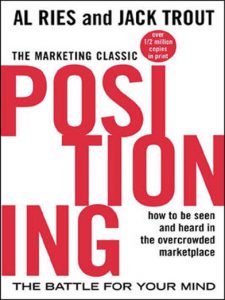I was having lunch with a client this past week, and I was told in no uncertain terms of a mutual acquaintance that does not like me personally.
In fact, it was expressed to me that this person hates the living daylights out of my guts. Let’s set aside the fact that he and I have never had a conversation and have most likely have said ‘hello’ to each other twice in passing. (Let’s also set aside that I am a extremely lovable & loyal guy.)
It was explained to me that he hates my guts because he doesn’t like that “Alex Patton engages in negative campaigning.”
This conversation was running through my head as I went home and re-read a classic book by Al Ries and Jack Trout, “Positioning: The Battle for your Mind”.
I last read the book about 5 years ago, but you could tell from my scribbles in the margins and markup, I liked the book.
I think my favorite line from the book:
“culture and refinement may be admirable qualities, but not in advertising.”
Positioning: The Battle for your Mind, pg 69
I often think about that quote and the book when working with political clients.
Here is another quote from the book that seems appropriate:
“to climb on his or her product ladder, you must relate your brand to the brands already in the prospect’s mind.”
Positioning: The Battle for your Mind, pg 69
This is especially true when a candidate is challenging an incumbent.
Let’s relate a campaign to a business endeavor, since so many business people think they have the political answers.
The situation is you are a challenger to an incumbent or brand leader. You, the challenger, are now going after market share in the voters mind. A space that we can assume the incumbent is the market leader with at some point receiving at least 50% plus 1 market share.
What to do?
I have seen way too many candidates make the childish, amateurish mistake of challenging the brand leader for market share and attempt do it without mentioning the brand leader.
A candidate can not write a campaign speech not mentioning the incumbent and not comparing yourself directly to the incumbent. It is a recipe for a complete disaster. After all, if a challenger is no different, then the consumer will remain with the market leader.
If a candidate is challenging the incumbent,”you must relate your brand already in the prospect’s mind” otherwise a candidate best be prepared to spend ungodly amounts of money in an endeavor still likely to have a low probability chance of dislodging the market leader.
If a candidate does not have the confidence to position him/her self against the brand leader and explain how he/she is different, the challenger will never break through the clutter and noise of a campaign. A challenger will say a lot, yet at the same time say absolutely nothing.
A challenger will campaign and most likely run a campaign that he/she finds to be “cultured and refined”. Congratulations, you just got your butt kicked. Please, enjoy the opera.
Let’s be clear, I do not take joy in negative campaigning nor do I use it in every campaign. However, when the situation calls for it, we will not hesitate to perform our duties for our clients to help them navigate to victory.
And you know what? I am okay with that.
PS. And to prove that I am such a lovable guy, I will be sending a copy of the book to some of my ‘favorite’ unsuccessful candidates, maybe they can read it and re-tool for their next run.
